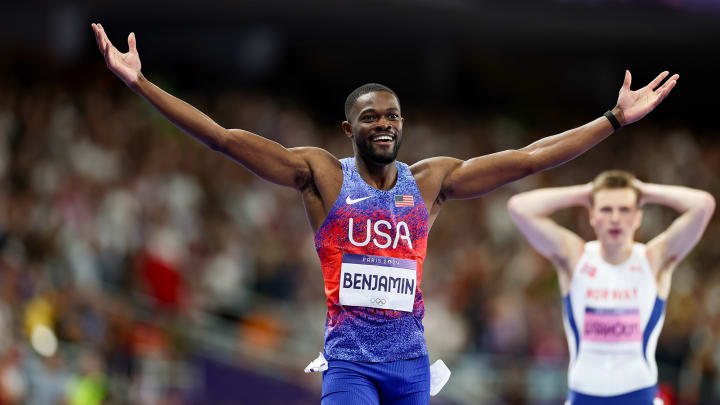Rai Benjamin Finds Redemption in Star-Studded 400-Meter Hurdles Rematch

SAINT-DENIS, France — Rai Benjamin’s 400-meter hurdles race was going great until, about 70 percent of the way through it, something appeared before him. Oh, right, he realized. A hurdle.
“I was just so focused on running fast, and those hurdles kind of get in my way,” he said, offering an elegant description of the challenge of the event. “It’s kind of annoying, because you want to go, but you can’t go, because these bears are in your way. So I think I got lost there trying to sprint, and forgot, like, O.K., I need to actually hurdle this thing correctly.”
He landed awkwardly coming off the seventh hurdle, which meant his stride was off heading into the eighth. He begged himself not to fall. He had to stretch for the 10th hurdle. He begged himself not to get caught. Then, with five meters to go: “I was like, Oh s---,” he said. “I got it.”
He gazed up at the clock: 46.46 seconds, just over half a second behind the world record, set by Norwegian Karsten Warholm in Tokyo—but just over half a second ahead of Warholm in Paris.
Benjamin tore off his bib, his latest shot in his war against them—“These shoe companies go out and they spend all this money on research and development and make all these aerodynamic uniforms, and then you just put a paper bib on it,” he lamented. “We might as well just run in a T-shirt at that point”—and wrapped himself in an American flag.
“It wasn’t, like, particularly, like, the quickest,” Benjamin said. “But we got it done.”
Three years after one of the greatest races of all time in Tokyo—Benjamin broke the world record and had to settle for silver—Friday’s rematch lacked the same tension. Warholm clipped the ninth hurdle and knew it was over. “These are the types of mistakes you can’t afford at this level,” he said after taking silver this go-around.
But Benjamin said afterward that he felt he, Warholm, and Brazil’s Alison dos Santos, the bronze medalist in Tokyo and Paris, had taken the event to a new stratosphere. All three have won world titles. Edwin Moses, who won Olympic gold in the 400-meter hurdles in 1976 and ’84, ran a time of 47.02 in ’83 to set the world record. That figure has been bested 26 times since then—24 times by Benjamin, Warholm or dos Santos.
“It’s a different era now,” said Benjamin, who turned 27 last week. “A lot of them say it’s the shoes, it’s the track, but honestly, we’re just better.”
Dos Santos said he was proud to achieve bronze “in this era of 400-meter hurdles, because it’s the best era ever.”
Perhaps in part for that reason, Benjamin said he made peace before the race with any result. He has spent years dreaming of what he considers to be his first Olympic gold—the one he picked up in the 4X400-meter relay doesn’t count—but he decided this cycle to try to have fun. He called himself “the unspoken team captain of these Games” and said he tries to crack jokes at tense moments. He and teammate Kenneth Rooks both raced on Wednesday—Benjamin first, in the semifinal for the 400-meter hurdles, then Rooks in the 3000-meter steeplechase final—and Benjamin promised him, “I’m gonna keep that mother------ warm for you!” Rooks won a shocking silver medal, his first world medal.
“This is an individual sport, but we’re here as a team,” Benjamin said. The Americans have won 29 medals in track and field, 11 of them gold. As he spoke, previous U.S. medalists, being honored that night, walked by and congratulated him: Melissa Jefferson, Sha’Carri Richardson, Twanisha Terry and Gabby Thomas, who had just won gold in the 4X100-meter relay, and Sydney McLaughlin-Levrone, who demolished her own world record to win the women’s 400-meter hurdle race Thursday.
“People think I’m not mentally tough enough to do this, but like [men’s 100-meter bronze medalist] Fred [Kerley] always says, this is not pressure, man,” Benjamin said. “This is a pleasure. Real pressure is trying to find food and feed your family and pay bills. And what we do is entertainment. I’m not saving any lives. At the end of the day, we’re just running in a damn circle.”
And in his case, jumping over stuff, as he remembered just in time.
